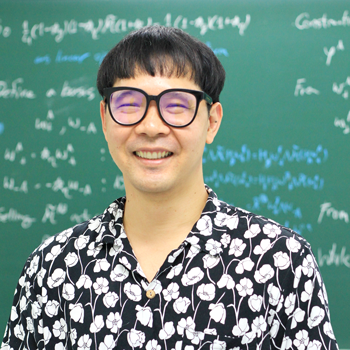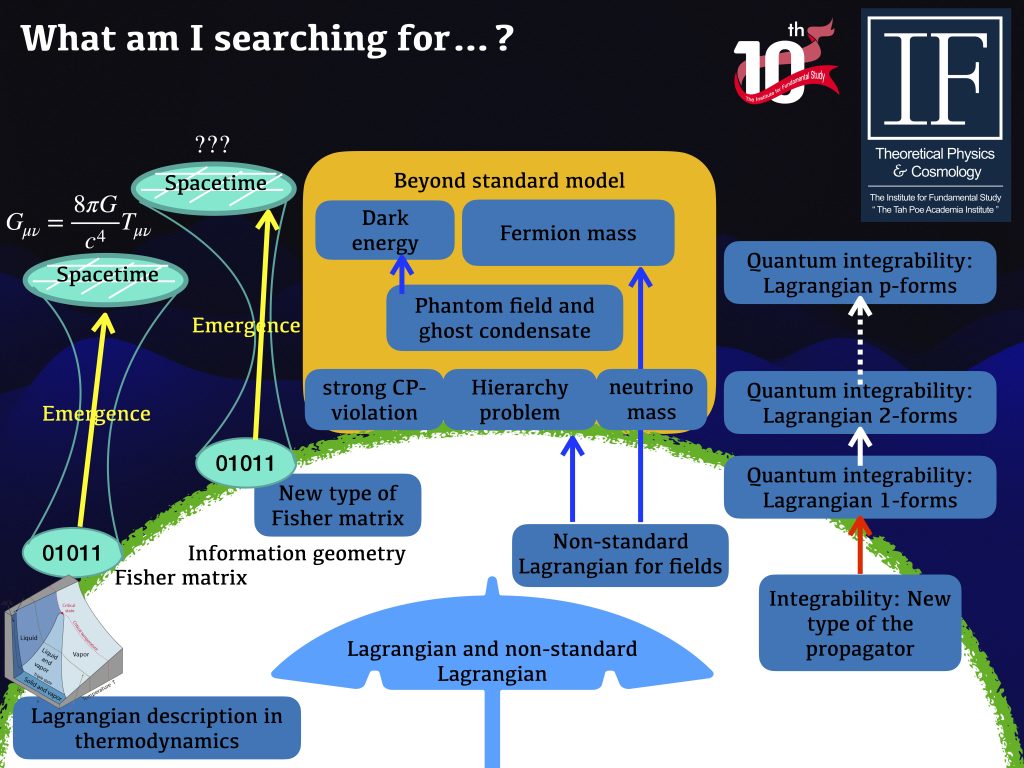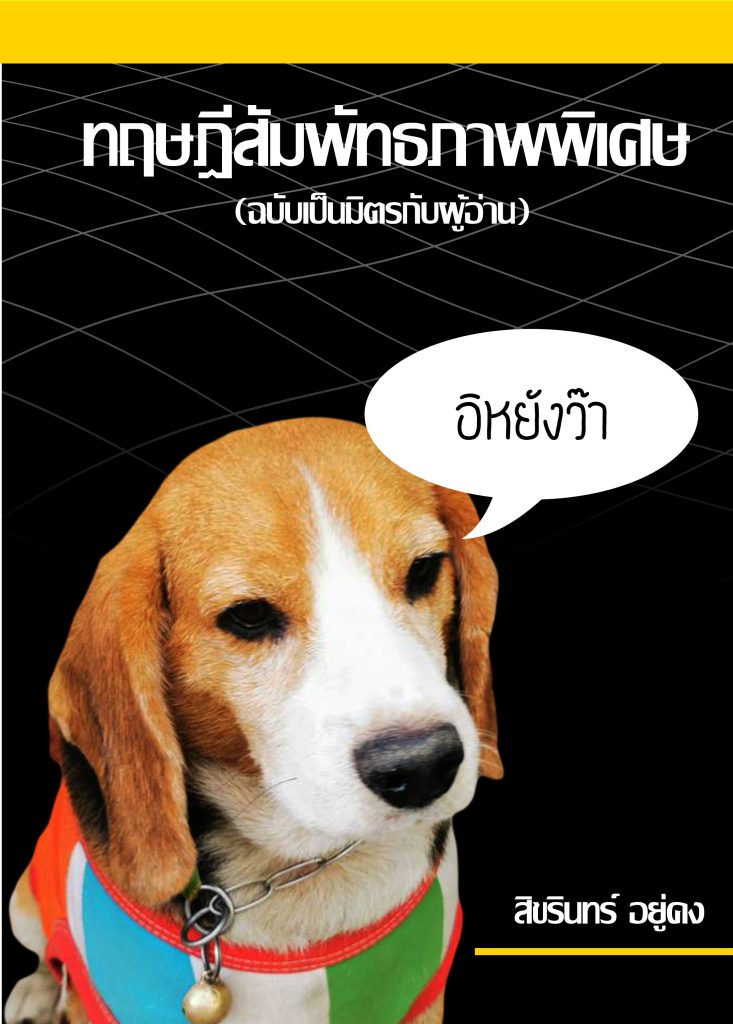
Assoc.Prof. Sikarin Yoo-Kong, Ph.D.
- Associate Professor of Theoretical Physics
- Organizer of the PhysPhit Colloquium Series
- IF Deputy Director of Strategy
Laboratories :
- Laboratory of Integrability, Field Theories and High Energy Physics (IFTHEP)
- Laboratory of Quantum Information Sciences (QIS)
Pages :
Youtube :
- B.Sc. (Physics), King Mongkut's University of Technology Thonburi (KMUTT), Thailand.
- M.Sc. (Physics), Mahidol University, Thailand.
- M.Sc. (Applied Mathematics), University of York, United Kingdom.
- Ph.D. (Applied Mathematics), University of Leeds, United Kingdom.
Research interests
A bird's eye view on what I am searching for....

Research topics
1) Integrability and multi-dimensional consistency
An integrable system is a mathematical model that can be solved exactly using certain mathematical methods. In more specific view, an untenable system is a system of differential (different) equations that can be solved by means of the inverse scattering transform, the Bethe ansatz, or other methods that allow for explicit expressions of solutions in terms of integrals. One of the key properties of integrable systems is the presence of an infinite number of conserved quantities, known as the Liouville's integrability, which are related to symmetries of the system. These conserved quantities allow for the preservation of certain properties of the system over time, and can provide insight into its long-term behaviour. A key integrable feature in this context is the Hamiltonian commuting flows. Moreover, untenable systems are also characterised by the absence of chaos (irregular pattern), which means that small perturbations do not lead to unpredictable behaviour.
Multi-dimensional consistency refers to the property of integrable systems in which the equations of motion for different components of the system are compatible with each other in multi-dimension. In other words, the equations for each component are consistent with each other, so that a solution for one component uniquely determines a solution for the others. This property ensures that the behaviour of the system can be predicted exactly and with complete accuracy, making integrable systems particularly useful for mathematical and theoretical analysis. Nowadays, the multi-dimensional consistency is a hallmark of integrable systems and is a key feature that distinguishes them from non-integrable systems.
Another important notion of integrability is the Lagrangian multi-form which was recently developed in the past 10 years. Lobb and Nijhoff first set out to formulate the discrete theory for 2-form and 3-form cases. A key relation in this context is the Lagrangian closure relation (equivalently with Hamiltonian commuting flows), which holds on the solution of the system, as a direct result of the variation of the action with respect to independent variables. The existence of the Lagrangian closure relation guarantees the constant value of the action under local deformation of the surface in the 2-form case and the volume in the 3-form case on the space of independent variables. Soon later, the 1-form case was formulated by Yoo-Kong, Lobb and Nijhoff (Here is my PhD thesis) in both discrete and continuous levels through an important integrable model known as the Calogero-Moser system. Again, the existence of the Lagrangian 1-form closure relation guarantees the constant value of the action under local deformation of the curve on the space of independent variables. Therefore, the feature implies path-independent property and the multi-time evolution does not depends on the choice of paths, but rather the end points on the space of independent variables. Indeed, this is nothing but the multi-dimensional consistency feature which is represented in the level of Lagarngians (Of course, Hamiltonian commuting flows can be also treated as the multi-dimensional consistency on the level of Hamiltonians). After these pioneer works, a series of papers has been producing and pushing further in various aspects as well as various systems.

In quantum arena, the notion of integrability is not well established. Naively, one can follow the canonical quantisation by promoting a set of invariances or a set of Hamiltonians to be a set of Hamiltonian operators. Therefore, the integrability demands commutator of the Hamiltonian operators to be zero. However, Weight provided an encounter example, which is non-integrable system, satisfying the vanishing commutator condition. However, many attempts have been put further to investigate quantum integrability on demanding a quantum correction terms promoted from the invariances of the counterpart of classical system and commutations of them. In discrete level, a key tool to study quantum integrable system us the quantum mapping was established and was applied in the integrability context. Alternatively, Feynman approach on quantising the system might be a better choice. The pioneer works on this direction were investigated by Field and Nijhoff in the discrete systems. In 2019, King and Nijhoff set out to formulate quantum path integration incorporated with the quadratic Lagrangian multi-form structure in the discrete level.
- Supersymmetry (SUSY): This theory proposes that each known particle in the SMPP has a supersymmetric partner, which has a different spin. SUSY could solve the hierarchy problem and provide a candidate for dark matter.
- Grand Unified Theories (GUTs): These theories attempt to unify the strong, weak and electromagnetic interactions to a single framework. GUTs predict new particles and interactions, which could be observed at high energies.
- Extra Dimensions: These theories propose that there may be more than the three spatial dimensions and one temporal dimension that we experience. Extra dimensions could explain why gravity is so weak comparing to other interactions and could also solve the hierarchy problem.
- String Theory: This theory proposes that the fundamental building blocks of the universe is not particles, but tiny vibrating strings. String theory provides a way to construct a graviton. However, there is a price to pay which is an extra-dimension.
Recently, Supanyo and Yoo-Kong proposed a new form of the Lagrangian, namely the multiplicative form of the complex scalar field, to provide alternative explanation to the hierarchy problem and strong CP problem. For the hierarchy problem associated with the Higgs mass, the new form of the Lagrangian can provide a tiny quantum correction and a bare mass of the Higgs particle is in the same order with the observation 125 GeV. This means that , with this new way to write the Lagrangian, one needs no fine tuning. For the strong CP problem, our model can naturally explain the phenomenon without introducing a new hypothetical particle such as an axion.
With this new way of looking problems, there is a high potential for the multiplicative Lagrangian to give an alternative explanation to other problems in the realm of the beyond standard model of particles physics.
-
-
A question: Can thermodynamics go quantum ?
Well....Yes. And this field is rapidly flourishing.
Quantum thermodynamics is a field of study that combines principles from quantum mechanics and thermodynamics to understand how energy, work, and heat behave in systems governed by quantum laws. It extends classical thermodynamics to the quantum scale, where the behavior of particles and energy levels are fundamentally different due to quantum effects like superposition, entanglement, and discreteness of energy states.
However, what I have in mind is not exactly the same thing above. My question is "Can we quantise a thermodynamic system?" This question is might sound weird since thermodynamics is dealing with large classical systems, one might wonder what do you mean by saying about its quantum version. An interesting fact is that there is analogue structure between Hamiltonian mechanics and Thermodynamics, see John Baez. This intriguing connection would allow us to construct the thermodynamic phase space and of course, possibly, one might try to construct a quantum theory from this structure, like we did in the case of the classical mechanics.
- Sikarin Yoo-Kong, Sarah Lobb and Frank Nijhoff, 2011, “Discrete-time Calogero-Moser system and Lagrangian 1-form structure ”, Journal of Physics A: Mathematical and Theoretical, 44, 365203
- Kittikun Surawuttinack, Sikarin Yoo-Kong and Monsit Tanasittikosol, 2016, “Multiplicative form of the Lagrangian”, Theoretical and Mathematical Physics, 189(3), pp.1693-1711
- Suppanat Supanyo, Monsit Tanasittikosol, and Sikarin Yoo-Kong, 2022, "Natural TeV cutoff of the Higgs field from a multiplicative Lagrangian", Physical Review D, 106(3), 035020.
- Tanadon Kongkoom and Sikarin Yoo-Kong, 2023, "Quantum integrability: Lagrangian 1-form case", Nuclear Physics B, 987, 116101.
- Worachet Bukaew and Sikarin Yoo-Kong, 2023, "One-parameter generalised Fisher information matrix: One random variable", Reports on Mathematical Physics, 91(1), pp. 57-78.
- Publication list [Google Scholar Citations]
Articles
- [หลุมดําและข้อมูลที่หายไป…….ไหน??] Black hole information paradox, วารสารฟิสิกส์ไทย, Vol 35, No 2, 2018
Research grants
- King Mongkut’s University of Technology Thonburi Research Grant 2012
- Thailand Toray Science Foundation (TTSF) 2013
- Faculty of Science, King Mongkut’s University of Technology Thonburi Research Grant 2013
- The Thailand Research Fund (TRF): New Researcher 2013
- National Research Council of Thailand (NRCT) 2013
- National Research Council of Thailand (NRCT) 2014
- National Research Council of Thailand (NRCT) 2015
- National Research Council of Thailand (NRCT) 2017
- JSTP 2019-2020


- เอนโทรปี อินฟอร์เมชันและฟิสิกส์

- นักฟิสิกส์บ่นคณิตศาสตร์

Book chapters
- Non-Uniqueness of Hamiltonian for the system with 1 degree of freedom(invited), 2019, “Progress in Relativity”, ISBN 978-1-78985-358-2, IntechOpen, Published December 13th 2019
- Composition of Quantum Operations and Their Fixed Points, 2020, “Data Science for Financial Econometrics”, ISBN 978-3-030-48853-6, Springer, Cham.
Workshop/Short courses
- โครงการระบบอินทีเกรเบิลเบื้องต้นสำหรับกลศาสตร์คลาสสิค(Introduction to integrable systems in classical mechanics)(in Thai), 24-26 Dec 2019 Lecture notes
- โครงการโลกอันแปลกประหลาดของควอนตัมเอนแทงเกิลเมนท์(The strange world of quantum entanglement)(in Thai), 26-28 Dec 2020 Lecture notes
Talks
- The variational principle for Lagrangian 1-forms, Discrete Integrable Systems- a follow up meeting, 8th July 2013
- A new family of Lagrangians for the system with one degree of freedom, Invited Talk for undergraduate students, Department of Physics, Faculty of Science, Thammasat University(Rangsit Campus), 11th September 2017.
- หลุมดำนั้นมีอยู่จริง….., โครงการพัฒนาอัจฉริยภาพทางวิทยาศาสตร์และเทคโนโลยีสำหรับเด็กและเยาวชน ระดับมัธยมศึกษาตอนต้น (JSTP) ขอเชิญนักเรียนในโครงการฯ เข้าร่วมกิจกรรมค่ายเสริมประสบการณ์ รุ่นที่ 22 ครั้งที่ 1 ระหว่าง วันอาทิตย์ที่ 28 เมษายน 2562 ถึง วันศุกร์ที่ 3 พฤษภาคม 2562 ณ THE COP Seminar & Resort อำเภอบางละมุง จังหวัดชลบุรี
- ความประหลาดของควอนตัม(The strange world of quantum mechanics) (in Thai),”โครงการบรรยายวิชาการเรื่องเทคโนโลยีควอนตัมและวัสดุ2มิติ” at Department of Physics, Faculty of Science, Mahasarakham University, 10th September 2019.
- Entanglement and the strange world of quantum mechanics, Tah Poe Seminar Series, 20th September 2019, IF NU.
- Integrability in classical mechanics, QTFT Webinars(On line), 13th October 2019.
- สมมาตรและฟิสิกส์(Symmetry and Physics), Department of Mathematics, King Mongkut’s University of Technology North Bangkok, 15th January 2020.
- What is Integrability?, Math CU Seminar, 23 กุมภาพันธ์ 2565.
-
Tah Poe Seminar - สัมมนาท่าโพธิ์ อนุกรมที่ 47 ลำดับที่ 3: Black hole information paradox simplified.
-
Tah Poe Seminar - สัมมนาท่าโพธิ์ อนุกรมที่ 51 ลำดับที่ 4: Entropies, Fisher information and their generalisation.
-
Tah Poe Seminar - สัมมนาท่าโพธิ์ อนุกรมที่ 53 ลำดับที่ 2: The q-deformed Fisher matrix.
-
Tah Poe Seminar - สัมมนาท่าโพธิ์ อนุกรมที่ 53 ลำดับที่ 4: Physics beyond standard model and non-standard Lagrangian.
- ICIAM2023 TOKYO, Waseda University, August 20-25, 2023, 1oth International Congress on Industrial and Applied Mathematics: Quantum variational principle: Lagrangian 1-form case (Invited Talk).
- Tah Poe Seminar - สัมมนาท่าโพธิ์ อนุกรมที่ 54 ลำดับที่ 4: Quantum variational principle: Lagrangian 1-form case
- Lagrangian Multiform Theory and Pluri-Lagrangian System, The Institute for Advanced Study in Mathematics, Hangzhou, China, October 22 - 27, 2023: Multidimensional consistency and quantum variational principle: quadratic Lagrangian 1-form.
Newton’s term (June 24 - October 28, 2019)
897602 : Geometrical Methods in Physics (Ph.D. Course)
897566 : Quantum Mechanics and Path Integrals (M.Sc. Course)
Boltzmann’s Term (November 25, 2019- March 30, 2020)
897565 : Relativistic Quantum Mechanics (MSc Course)
Maxwell’s Term (June 25 - November 24, 2020 )
897603 : Integrable systems (PhD Course)
897604 : Advanced Mathematical Physics (PhD Course)
Boltzmann’s Term (November 25, 2020- March 30, 2021)
- 897565 Classical field theory [MSc Course] Here is a full list of the course
Maxwell’s Term (June 25 - November 24, 2021 )
897503 Green's function and propagator [MSc Course]
Physics Problems with Solutions
- Electrostatics Electric charge, force and field Gauss’s law Electric potential Capacitor Current and Resistance
- Triple integrals and the application in computing gravitational force Problem Solution
Notes
- [สนามแม่เหล็กในสสาร] เรียบเรียงขึ้นมาจากหนังสือ D. Griffith, Introduction to electrodynamics, 4th edition, Preason สำหรับ [The 2nd SIP+ Fest School “Classical Electrodynamics (Part I)” โรงเรียนเทศกาลแห่งเครือข่ายความร่วมมือ SIP+ Consortium ครั้งที่ 2 “พลศาสตร์ไฟฟ้าคลาสสิกภาค 1”]
- [สมมาตรและฟิสิกส์ 1] Symmetry and Physics 1
- [สมมาตรและฟิสิกส์ 2] Symmetry and Physics 2
- [เทนเซอร์ 1] Tensor 1
- [เทนเซอร์ 2] Tensor 2
- [เทนเซอร์ 3] Tensor 3
- [เทนเซอร์ 4] Tensor 4
- [ควอนตัมเอนแทงเกิลเมนต์] Quantum entanglement
- [พลังงานและข้อมูล] Energy and Information
- [อนุกรมฟูเรียร์และสุนทรีภาพทางดนตรี] Fourier series and music
- [กลศาสตร์นิวตัน] Newtonian mechanics
- [แผนที่กลศาสตร์ของระบบมวลจุด] Newtonian mechanics
Doctor of Philosophy Students (PhD Students)
- Mr. Umpon Jairuk(KMUTT)/ Thesis title: Calogero-Moser type systems and Lagrangian structure/ Status: Graduated(2012-2017)
- Mr. Kittikun Sarawuttinack(KMUTT co-advisor)/ Thesis title: On the quantisation of the multiplicative Hamiltonian/ Status: Ongoing(2017-present)
- Mr. Taweesin Rerkhajornnamkul(KMUTT co-advisor)/ Thesis title: TBA/ Status: Ongoing(2018-present)
- Mr. Ibrahim Yahaya Muhammad(KMUTT co-advisor)/ Thesis title: Quantum random walk of two entangled particles/ Status: Ongoing(2018-present)
- Mr. Suppanat Supanyo(KMUTT co-advisor)/ Thesis title: On the non-standard Lagrangian of the particle and field thoery/ Status: Ongoing(2019-2023)
Master of Science Students (MSc Students)
- Mr. Chisanupong Puttaprom(KMUTT)/ Thesis title: Entanglement for a particle coupling with its surrounding/ Status: Graduated(2011-2013)
- Mr. Kittikun Sarawuttinack(KMUTT)/ Thesis title: On the Multiplicative form of the Lagrangian/ Status: Graduated(2014-2016)
- Mr. Watcharanon Kantayasakun(KMUTT)/ Thesis title: Entanglement entropy for discrete-time two coupled harmonic oscillators/ Status: Graduated(2016-2018)
- Miss Siwaporn Sungted(IF)/ Thesis title: Multi-time propagator, integrability and Wilson loops/ Status: Graduated(2019-2022)
- Mr. Worachet Bukaew(IF)/ Thesis title: One-parameter extension Fisher information/ Status: Graduated(2019-2022)
- Mr. Thanadon Kongkom(IF)/ Thesis title: Geometrical representation of the multi-dimensional consistency : 1-form case /Status: Graduated(2020-2023)
Bachelor of Science Students (BSc Students)
- Mr. Kittikun Sarawuttinack(KMUTT)/ Thesis title: Free quantum particle, backward in time and quantum teleportation/ Status: Graduated(2013-2014)
- Mr. Sakdithut Jitpienka(KMUTT)/ Thesis title: A new feature for the classical collision theory: Discrete-time scale/ Status: Graduated(2014-2015)
- Mr. Watcharanon Kantayasakun(KMUTT)/ Thesis title: Discrete-time two coupled harmonic oscillators/ Status: Graduated(2015-2016)
Internship Students
- Paweerapakorn Netduang- Department of Physics and Material Sciences, Chiang Mai University (1 April – 31 May 2022)-Topic: Integrable systems
- Chanon Hasuwannakit-Department of Physics, University of Oxford (3 July – 31 September 2023)- Topic: Quantum field theory and beyond standard model
- Noppadon Panmanee- Department of Physics, Naresuan University (13 November 2023 – 29 February 2024)-Topic: Non-standard Hamiltonian and Lagrangian
- Paradon Kraisut-Department of Physics, Mahidol University, (1 April-31 May 2024)-Topic: Non-extensive Hamiltonian and Tasllis entropy
- Grabriel Suarez, Department of Physics and Astronomy, University of Kentucky, (1 April-31 May 2024)-Topic: Reducing and Relating Lagrangian multiform with geometry & topology
